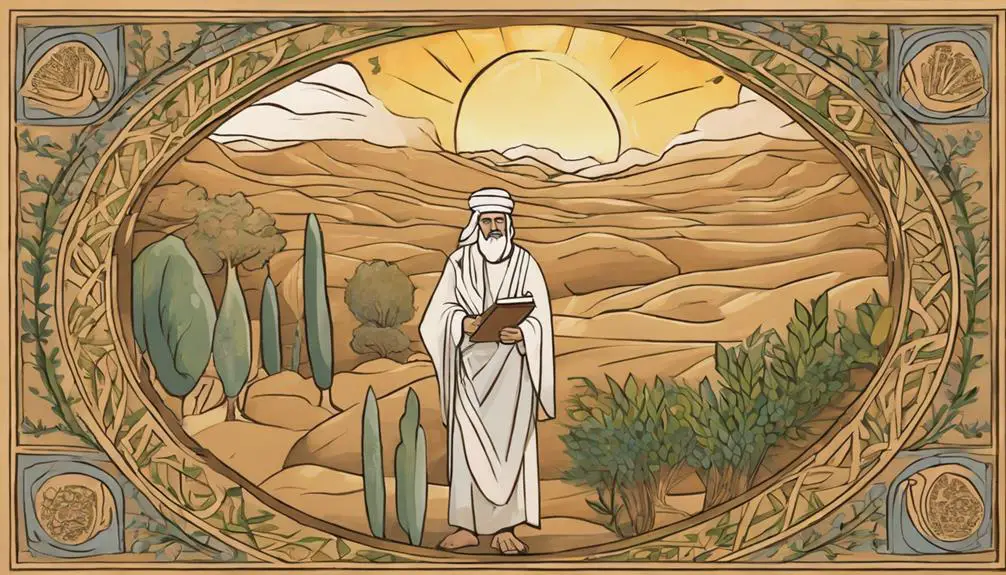Navigate the profound layers of 'Jeshurun' in the Bible, uncovering the intricate dance between divine favor and human imperfection.

Jeshurun in the Bible
Just as a sculptor sees potential in a block of marble before the first strike of the chisel, the term 'Jeshurun' in the Bible represents a unique metaphor for a nation chosen yet prone to wander. You've likely encountered its mention in Deuteronomy and Isaiah, but the layers of its significance are deeper than a casual glance would suggest.
Unpacking the origins, the symbolic nature, and the lessons encapsulated in the name Jeshurun invites you to explore an aspect of biblical literature that intertwines divine favor with human frailty. What might initially appear as a mere footnote in Scripture could illuminate pathways of understanding regarding identity and transformation, beckoning a closer look at the ancient texts and their relevance today.
Key Takeaways
- Jeshurun symbolizes Israel's ideal state of righteousness in its covenantal relationship with God.
- It serves as a poetic nickname reflecting Israel's spiritual journey and fidelity to divine commands.
- The term enriches biblical narratives by highlighting themes of blessings, curses, and the consequences of faithfulness or lack thereof.
- Jeshurun's metaphorical use inspires lessons on moral and spiritual growth, warning against complacency among the chosen.
The Origins of Jeshurun

The term 'Jeshurun,' a poetic and endearing appellation found in the Bible, originates from a Hebrew root that conveys the concept of uprightness or righteousness, symbolizing Israel's ideal state in its relationship with God. This designation's naming significance extends beyond a mere title, embedding within it a rich tapestry of theological and moral expectations. It's not just a name; it's an aspiration, a beacon guiding the people towards their highest virtues and a covenantal life in harmony with divine ordinances.
Analyzing the geographic implications of 'Jeshurun' offers a nuanced understanding of its usage. While not directly naming a specific location, the term metaphorically maps Israel's spiritual landscape, charting a course towards an envisaged national identity rooted in ethical and religious integrity. It's an idealized representation, devoid of physical borders, yet profoundly territorial in its spiritual demarcation. 'Jeshurun' thus serves as a compass, orienting the collective consciousness of a people towards their divine purpose, encapsulating their journey from a mere nation to a community exalted for its righteousness.
Jeshurun in Deuteronomy
Exploring Jeshurun's appearances in Deuteronomy reveals a layered portrayal of Israel's spiritual journey, emphasizing a covenantal relationship marked by blessings and admonitions. Within the Deuteronomy context, Jeshurun serves as a poetic, affectionate nickname for Israel, encapsulating the nation's ideal state under divine favor. This usage emerges in moments of profound reflection on the covenant between God and His people, highlighting a shift from mere historical recounting to a more evocative, poetic expression of Israel's identity and destiny.
The term's deployment in Deuteronomy isn't merely ornamental; it's strategically placed to underscore pivotal themes of loyalty, gratitude, and the peril of forgetting one's divine benefactor. As you delve into the text, you'll notice that Jeshurun's appearances are closely tied to discussions of the covenant's blessings and curses, serving as a poignant reminder of the consequences of Israel's fidelity or infidelity to God. This dual aspect of Jeshurun—both as an emblem of Israel's highest potential and a warning against complacency—resonates through the Deuteronomy context, offering a rich tapestry of theological and moral insights.
The poetic usage of Jeshurun thus becomes a key to understanding the deeper layers of Israel's covenantal relationship with God, as presented in Deuteronomy.
The Isaiah Connection

In Isaiah's writings, we uncover another layer of Jeshurun's significance, revealing a nuanced portrayal of Israel that deepens our understanding of its divine relationship. Within this prophetic context, Isaiah's prophecies serve as a critical lens through which we explore Jeshurun's role not just as a mere designation for Israel, but as a symbol of its fluctuating fidelity and the complexities of its covenant with God. Isaiah's discourse presents a multifaceted view of Israel, oscillating between rebuke and redemption, which underscores the dynamic nature of Jeshurun's identity.
Isaiah's use of Jeshurun, therefore, isn't incidental but deeply intentional, embedding within it layers of theological and historical significance. It reflects a period of profound existential and spiritual crisis for Israel, offering insights into the nation's struggles and its hopes for divine intervention. The prophetic context in which Isaiah situates Jeshurun illuminates the prophet's broader message of judgment and hope, encapsulating the tension between divine wrath and mercy. This analysis reveals how Isaiah's prophecies enrich our understanding of Jeshurun, presenting it as a pivotal concept that captures the essence of Israel's relationship with God across different eras of its history.
Symbolism and Interpretation
Delving into Jeshurun's symbolism reveals layers of meaning that significantly enhance our interpretation of biblical narratives, offering a rich tapestry of cultural, religious, and historical insights. This term, often overlooked, carries with it a profound depth that intersects with various facets of study and understanding.
Consider these aspects of Jeshurun's symbolism:
- Representation of an Ideal State: Jeshurun symbolizes the ideal relationship between God and Israel, illustrating a state of favor and blessedness.
- Moral and Ethical Implications: The name evokes themes of righteousness and justice, challenging readers to reflect on their own moral standing.
- Modern Parallels: In contemporary discussions, Jeshurun serves as a metaphor for societal aspirations towards unity and integrity, echoing the ancient call for communal and spiritual solidarity.
- Artistic Depictions: Throughout history, artists have been inspired by Jeshurun's symbolism, creating works that capture its essence and provoke contemplation on the divine-human relationship.
These elements underscore the complexity and richness of Jeshurun's symbolism. By engaging with these layers, you gain a more nuanced understanding of biblical texts, bridging ancient narratives with modern reflections on faith, community, and identity.
Lessons From Jeshurun

Reflecting on Jeshurun's symbolism, it's crucial to understand the lessons this biblical figure imparts, offering insights into ethical conduct and spiritual growth. Jeshurun, a poetic name for Israel, symbolizes an ideal state of moral and spiritual fidelity. Yet, it also serves as a cautionary tale about complacency and the potential for downfall even among the chosen and prosperous. This duality holds profound modern implications, suggesting that spiritual growth isn't a destination but a continual journey.
Your commitment to ethical behavior, akin to Jeshurun's, isn't merely about adherence to a set of rules but encompasses the cultivation of a heart and spirit attuned to righteousness. It's a reminder that blessings, whether material or spiritual, shouldn't lead to arrogance or a sense of entitlement but should foster humility and a deeper commitment to one's values and community.
Moreover, Jeshurun's story underscores the importance of remembering one's roots and maintaining a steadfast relationship with the divine, especially in times of abundance. This narrative invites you to reflect on your own spiritual journey, encouraging a balance between celebrating achievements and remaining vigilant against complacency. In essence, Jeshurun's lessons are timeless, urging you toward continuous self-examination and spiritual maturation.
Frequently Asked Questions
How Has the Name "Jeshurun" Influenced Modern Names or Been Used in Contemporary Contexts Outside of Religious Texts?
You mightn't realize it, but the name Jeshurun has trickled into modern use, influenced by its etymology and the broader trend of pulling from historical or literary sources for personal naming. Analyzing naming trends, it's clear that Jeshurun's uniqueness and rich background appeal to those seeking distinctive names.
This trend underscores how ancient names, stripped of their immediate religious context, find new life in contemporary settings, reflecting a blend of tradition and individuality.
Are There Any Notable Artworks or Pieces of Music Inspired Specifically by the Biblical References to Jeshurun?
You're barking up the right tree if you're searching for artistic interpretations or musical compositions inspired by Jeshurun.
Delving into this niche, you'll find that while the reference mightn't headline mainstream galleries or playlists, it certainly permeates through a select few pieces with a deep, scholarly allure.
These works, albeit scarce, offer a rich tapestry of cultural and spiritual insights, weaving biblical references into their creative fabric with thoughtful precision.
How Do Different Jewish Denominations Interpret the Significance of Jeshurun in Their Teachings and Practices Today?
You're diving into how various Jewish denominations today interpret the significance of a term, focusing on denominational differences and Jeshurun's etymology. Each denomination brings its unique perspective, influenced by their theological underpinnings and historical contexts.
Reform Judaism might emphasize its metaphorical meanings, aligning with modern values, whereas Orthodox communities could stress its traditional connotations, deeply rooted in classical interpretations.
This nuanced analysis reveals the rich tapestry of beliefs and practices that shape contemporary Jewish thought.
Can Parallels Between the Concept of Jeshurun and Similar Figures or Symbols in Other Ancient Cultures Be Drawn?
You're opening Pandora's box when you explore mythical parallels and cultural symbolism across ancient cultures.
Indeed, it's possible to draw connections between certain figures or symbols and similar archetypes in other traditions. These parallels often highlight shared human experiences and values that transcend individual cultures.
Analyzing such similarities provides a detailed and scholarly insight into how different societies have navigated complex concepts of identity, morality, and divine favor.
What Role Does Jeshurun Play in Interfaith Dialogues, Especially in Discussions That Involve Comparative Theology?
In interfaith dialogues, especially those focusing on comparative theology, you're tackling ecumenical challenges and exploring theological implications.
Without specific context, it's about how different faith traditions interpret and discuss shared or similar concepts.
You're delving into how these discussions can bridge gaps, foster understanding, and sometimes reveal the complexities of integrating diverse theological views.
It's a nuanced exploration of faith that requires a deep understanding of each tradition's perspectives and beliefs.
Conclusion
In unraveling the tapestry of Jeshurun's narrative, you've traversed from its enigmatic origins to its profound presence in Deuteronomy and Isaiah, unearthing layers of symbolism and lessons.
Like a beacon in the wilderness, Jeshurun mirrors the oscillations of faith and favor, guiding you through the complexities of interpretation.
In this scholarly journey, you've not only encountered the historical and theological dimensions of Jeshurun but also engaged with its timeless call to introspection and spiritual renewal.
Through Jeshurun's story, you've glimpsed the intricate dance between divine love and human response, a dance as ancient as it's eternal.



Sign up